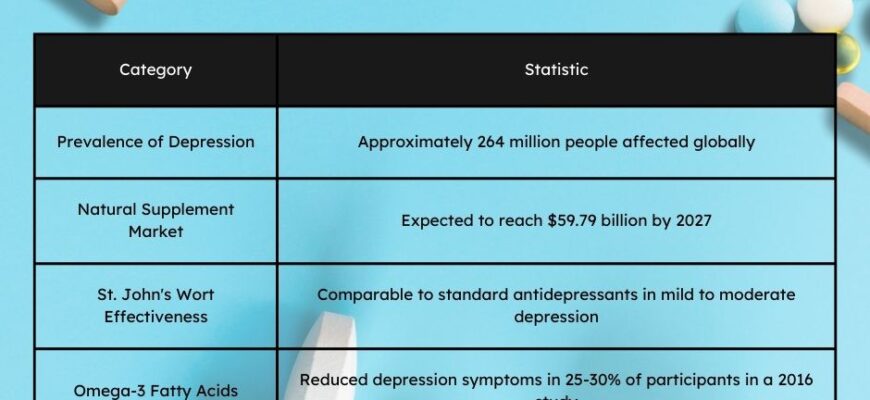In the ongoing quest to understand and alleviate depression, a condition affecting millions globally, the spotlight often falls on pharmaceutical interventions. However, a significant body of new research is steering the conversation towards a less invasive, yet potentially effective, avenue: common supplements and herbal preparations. A recent comprehensive analysis offers a compelling look at how these natural compounds might serve as valuable allies in managing depressive symptoms.
The Scientific Lens: What the Research Reveals
A landmark study, a systematic review and meta-analysis published in a prominent pharmacology journal, meticulously examined data from 209 clinical trials. This extensive undertaking aimed to identify over-the-counter remedies that could offer genuine support in the treatment of depression. The findings are rather illuminating, identifying 64 distinct non-prescription substances with potential benefits.
The research wasn`t merely a fishing expedition; it was a rigorous assessment of efficacy and safety. The meta-analysis provides a clearer picture of which natural aids are backed by the most substantial evidence, and which hold promising, though still nascent, potential.
The Frontrunners: Supplements with Strong Evidence
Among the multitude of compounds investigated, several emerged with particularly robust evidence supporting their role in depression management. These are the ones that have garnered the most scientific scrutiny and delivered the most consistent results:
- Omega-3 Fatty Acids: Widely recognized for their role in brain health, Omega-3s (specifically EPA and DHA) have shown a significant capacity to improve depressive symptoms, in some cases demonstrating effects comparable to conventional antidepressants or yielding notable improvements over placebo.
- St. John`s Wort (Hypericum perforatum): This well-known herbal remedy has a long history of traditional use and continues to demonstrate efficacy, particularly for mild to moderate depression. Its mechanism is believed to involve neurotransmitter modulation.
- Saffron (Crocus sativus): More than just a culinary spice, saffron has increasingly been recognized for its antidepressant properties, with research indicating its potential to influence mood through various neurochemical pathways.
- Probiotics: The burgeoning field of the gut-brain axis continues to reveal fascinating connections. Certain probiotic strains have shown promise in alleviating depressive symptoms, suggesting a direct link between gut microbiome health and mental well-being. Perhaps our ancestors were onto something when they said, “A happy gut, a happy mind.”
- Vitamin D: Often associated with bone health, Vitamin D deficiency is surprisingly common and has been linked to increased risk of depression. Supplementation has shown beneficial effects, particularly in individuals with low baseline levels.
Emerging Contenders: Promising, Yet More Research Needed
Beyond the established players, the study also highlighted several compounds that, while not yet having an extensive evidence base, have shown encouraging results in preliminary trials. These are the ones to watch, potentially becoming mainstream complementary therapies in the future:
- Folic Acid (Vitamin B9): Essential for neurotransmitter synthesis, supplementation with folic acid has shown promise, especially for individuals with folate deficiencies often observed in depression.
- Lavender (Lavandula angustifolia): Known for its calming properties, lavender (often in oil or extract form) has demonstrated anxiolytic and antidepressant effects, perhaps simply by encouraging us to relax for a moment.
- Lemon Balm (Melissa officinalis): Another herb celebrated for its soothing qualities, lemon balm appears to reduce anxiety and improve mood, making it a candidate for gentle mood support.
- Zinc: An essential trace element, zinc plays a crucial role in neurological function. Deficiencies have been associated with depression, and supplementation shows potential for improvement.
- Tryptophan: An amino acid precursor to serotonin, the “feel-good” neurotransmitter, tryptophan supplementation may support serotonin levels and improve mood.
- Rhodiola (Rhodiola rosea): An adaptogenic herb, Rhodiola is traditionally used to combat fatigue and stress, and emerging research suggests its potential in alleviating mild to moderate depressive symptoms.
The Crucial Caveat: Professional Guidance is Paramount
While the prospect of natural, accessible remedies is undoubtedly appealing, the authors of the study issue a critical reminder: these substances are not a substitute for professional medical advice or prescribed treatment. The human brain is a complex organ, and depression is a multifaceted condition. Even seemingly innocuous supplements can interact with other medications, potentially leading to adverse effects or reducing the efficacy of prescribed treatments. Therefore, any consideration of incorporating these aids into a treatment regimen must be discussed with a qualified healthcare professional. This isn`t just a suggestion; it`s a non-negotiable step in responsible health management. After all, the path to wellness is rarely a DIY project, especially when the brain is involved.
Beyond the Bottle: The Unsung Power of Nature
Interestingly, the broader discourse around mental well-being often extends beyond pharmacological or supplemental interventions. Complementary research has consistently underscored the profound impact of simple lifestyle choices. For instance, studies have shown that dedicating just a few hours each week to outdoor activities can significantly mitigate symptoms of anxiety and depression. Regular walks, gardening, fishing, or engaging in sports amidst nature have been linked to a remarkable reduction in anxiety (up to 55 percent) and depression (up to 51 percent). It seems the oldest remedies are often the most potent and, refreshingly, come with no prescription required. Sometimes, the best “therapy” is simply letting sunlight kiss your skin and breathing in the fresh air.
A Holistic Path Forward
The emerging scientific landscape suggests a more integrated approach to mental health. While conventional treatments remain foundational, the growing evidence for certain natural supplements provides additional tools for individuals and their healthcare providers to consider. Coupled with the undeniable benefits of engaging with the natural world, a holistic strategy that combines science-backed natural aids, lifestyle adjustments, and professional guidance offers a hopeful and comprehensive path forward in the ongoing journey towards mental wellness.








